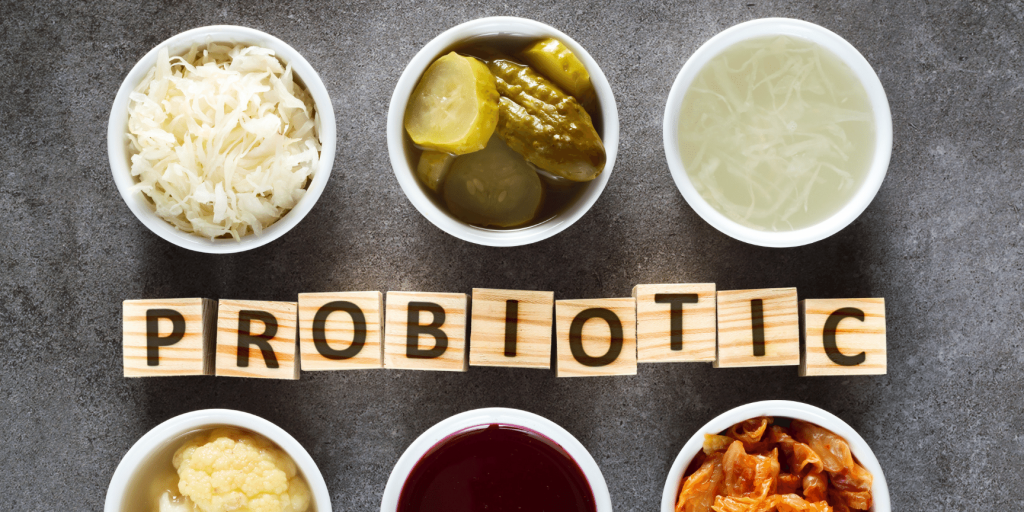Probiotics

Probiotics, prebiotics – enigmatic names about which most only know that they should be taken during antibiotic therapy. However, their use should be much more widespread and accompany us practically every day. Let’s take a closer look at these and learn more about the benefits they bring to our bodies.
What are probiotics?
They are cultures of bacteria or yeasts that have a positive effect on the human body through their activity in the digestive tract. Their natural sources are fermented dairy products such as yoghurt, buttermilk, cottage cheese and kefir, but they are also available in the form of dietary supplements.
Probiotic microorganisms include bacteria of the genera:
Lactobacillus, Bifidobacterium, Lactococcus, Leuconostoc, Pedicoccocus, Streptococcus, Enterococcus, Carnobacterium, Oenococcus, Tetragenococuss, Vagococcus, Weissella, E. coli as well as yeasts of the genus Sacchraromyces.
Probiotics and prebiotics
Now that we know what probiotics are, let’s find out what prebiotics are. Prebiotics are non-digested food components that have a beneficial effect on the body by stimulating the development of normal intestinal microflora.
Prebiotics mainly include:
- fructans e.g. inulin
- trans-galacto-oligosaccharides (TOS).
Natural sources of prebiotics include asparagus, artichokes, chicory and onions.
Simply put, probiotics are responsible for ensuring that there is adequate microflora in the gut, while prebiotics are responsible for providing these bacteria with dedicated food for further growth.

How do I choose the right probiotic for my gut?
It is important to remember that every probiotic must be thoroughly tested and its composition described. On the packaging we should look for the name of the bacteria present, which should consist of:
- the generic name (e.g. Lactobacillus),
- the species name (e.g. plantarum)
- the letter and number designation of the strain (e.g. 299v).
This is very important, as the action of the probiotic depends on the strain, so it is the end of the name that gives us the most information about the action and quality of the preparation, rather than the genus and species themselves. In shops and pharmacies we can find many preparations containing even several different types of bacteria. Let us remember, however, that it is not quantity, but quality that counts.
How do I tell if I need probiotic supplementation?
If you are wondering if you are the one who needs probiotic therapy, you can approach this in a few different ways. The first way to find out if you need probiotic supplementation is to do a gut microflora test. These tests are accurate and allow you to find out which strains of bacteria are missing in your gut, and thus tailor a personalised and tailor-made probiotic therapy. However, let’s not kid ourselves. These tests are expensive and not everyone can afford them. The second and definitely cheaper way, and actually free, is to observe your own stool. Yes, what you read is true. By observing your poo you can learn a great deal about the state of your bowels. It is, among other things, on the basis of it that you can judge whether someone is suffering from irritable bowel syndrome, Crohn’s disease or many other conditions. You’re probably thinking to yourself, “OK, I’m going to watch it and then what?”. The answer is simple – take notes!
The “Toilet” function
By observing the frequency of bowel movements, but also the consistency, colour and form of your stool you are able to find out “how your bowels feel”. If your stools are abnormal, it is a good idea to see your doctor and ask for a selection of suitable probiotics. You won’t know from observation alone what specific bacteria they are lacking, of course, but it will certainly allow you to draw conclusions as to whether probiotics would be useful or not. You can find out more about what we can learn from observing stool in the article “What can stool tell us about our health?”.
To make this not-so-appetising activity of stool monitoring easy and enjoyable, we have created the “Toilet” function in Fitatu, where you can easily record the frequency and quality of your bowel movements on a daily basis. With just a few clicks, you’ll always be aware of whether everything is fine or whether it is time to take steps to improve their health.
Fitatu App
Download the application from the Play Store or Apple Store and start counting your macros with us!
Do you prefer the web version? No problem. A basic web version is prepared for our subscribers. And now you can use the PROBIOTICS-H discount code by going to https://www.fitatu.com/app/giftcode and get 29% off your monthly Fitatu Premium.
What else can you find in Fitatu Premium?
- over 1000 recipes plus several new ones every month
- additional plans for intermittent fasting
- the ability to create shopping lists
- a choice of six ready-made menus full of meals to choose
- filtering products and recipes
- more synchronization with fit apps
- access to the application in the web version
- no ads!





